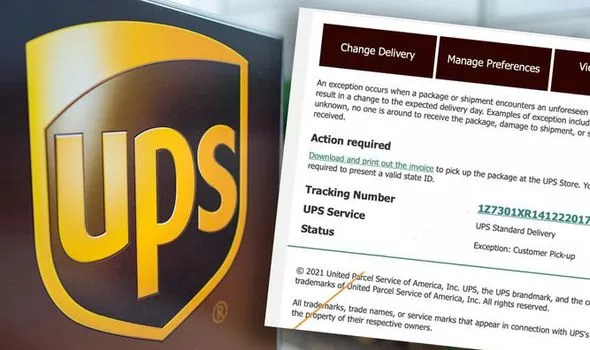The convenience of online shopping and package deliveries has unfortunately opened the door for scammers to exploit unsuspecting individuals. UPS scam text messages are a growing threat, designed to trick you into revealing personal information or making fraudulent payments. This article provides a comprehensive guide to understanding, identifying, and avoiding UPS scam text messages, empowering you to protect yourself from falling victim to these deceptive schemes.

Contents
How UPS Scam Text Messages Work
UPS scam text messages typically employ social engineering tactics to create a sense of urgency or fear, prompting you to act quickly without thinking critically. These messages often use the following tactics:
- Fake delivery notifications: The message claims that you have a package waiting for delivery but requires you to click a link or provide personal information to confirm delivery or reschedule.
- Phishing links: The message contains a link that leads to a fake website designed to mimic the official UPS website. This website may ask for your login credentials, credit card information, or other sensitive data.
- Requests for payment: The message claims that you need to pay a fee to release your package or avoid delivery delays. This fee may be disguised as a customs fee, redelivery charge, or other seemingly legitimate expense.
- Spoofed phone numbers: Scammers may use spoofing technology to make the message appear to come from a legitimate UPS phone number or a number similar to yours, increasing the chances of you trusting the message.
- Urgent language: The message often uses urgent language, such as “Your package is on hold” or “Action required immediately,” to pressure you into acting quickly without thinking.
Identifying UPS Scam Text Messages
While UPS scam text messages can be convincing, there are several red flags that can help you identify them:
- Suspicious links: Be wary of any links in text messages, especially if they are shortened or lead to unfamiliar websites. Always double-check the URL before clicking on it.
- Unfamiliar phone numbers: If you receive a text message from a phone number you don’t recognize, be cautious. UPS usually communicates through official channels or known phone numbers.
- Requests for personal information: UPS will never ask for your personal information, such as your login credentials, credit card details, or Social Security number, via text message.
- Urgent or threatening language: Scammers often use urgent or threatening language to pressure you into acting quickly. Legitimate companies rarely use such tactics.
- Grammar and spelling errors: Scam messages often contain grammar and spelling errors, which can be a sign that the message is not from a legitimate source.
- Unexpected or unusual requests: If the message asks you to do something unusual or unexpected, such as pay a fee to release your package or provide personal information to confirm delivery, be suspicious.
Examples of UPS Scam Text Messages
Here are a few examples of UPS scam text messages to help you recognize the common tactics used by scammers:
- “UPS: Your package is on hold due to an unpaid shipping fee. Please update your information at [link].”
- “UPS: We were unable to deliver your package. Please click here to reschedule delivery: [link].”
- “UPS: Your package has arrived! Confirm your delivery address and pay the customs fee here: [link].”
- “UPS: Urgent! Your package is delayed. Please provide your delivery address and payment information to avoid further delays: [link].”
What to Do if You Receive a UPS Scam Text Message
If you receive a UPS scam text message, do not click on any links, reply to the message, or provide any personal information. Instead, follow these steps:
- Report the message: Report the scam text message to UPS by forwarding it to 7726 (SPAM). You can also report it to the Federal Trade Commission (FTC) at ReportFraud.ftc.gov.
- Block the number: Block the phone number that sent the scam message to prevent future messages from that number.
- Delete the message: Delete the scam text message from your phone.
- Contact UPS directly: If you have any concerns about a package delivery, contact UPS directly through their official website or phone number.
How to Protect Yourself from UPS Scam Text Messages
Here are some proactive steps you can take to protect yourself from UPS scam text messages:
- Be aware of the scam: Familiarize yourself with the common tactics used by scammers to avoid falling victim to their schemes.
- Don’t click on suspicious links: Never click on links in text messages from unknown senders.
- Never provide personal information via text: UPS will never ask for your personal information via text message.
- Verify package information: If you receive a text message about a package delivery, verify the information on the official UPS website or by contacting UPS directly.
- Install a security app: Use a reputable security app on your phone to help block spam messages and detect phishing attempts.
- Keep your software updated: Ensure that your phone’s operating system and apps are updated to the latest versions, which often include security patches to protect against known vulnerabilities.
What UPS is Doing to Combat Scam Text Messages
UPS is actively working to combat scam text messages and protect its customers from fraud. The company has taken the following measures:
- Educating customers: UPS provides information and resources on its website to help customers identify and avoid scam text messages.
- Working with law enforcement: UPS cooperates with law enforcement agencies to investigate and prosecute scammers.
- Implementing security measures: UPS uses various security measures to protect its systems and customer data from unauthorized access.
- Monitoring for scam activity: UPS actively monitors for scam activity and takes steps to shut down fraudulent websites and phone numbers.
Conclusion
UPS scam text messages are a growing threat, but by being aware of the scam and taking proactive steps to protect yourself, you can avoid falling victim to these deceptive schemes. Remember to never click on suspicious links, provide personal information via text, or respond to urgent or threatening messages. If you have any doubts about a message, contact UPS directly through their official channels.
By working together, consumers and businesses can create a safer online environment and prevent scammers from exploiting unsuspecting individuals.







